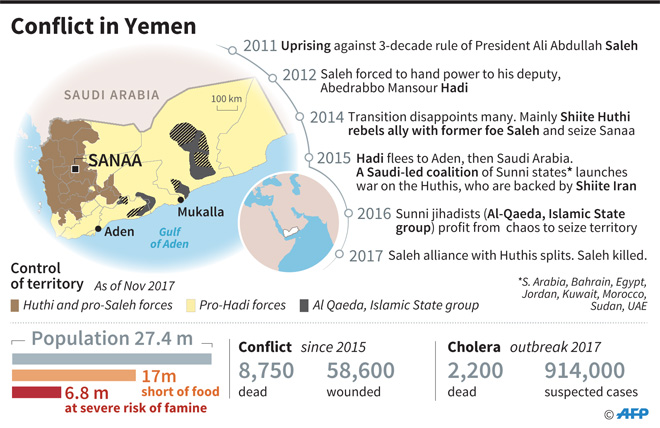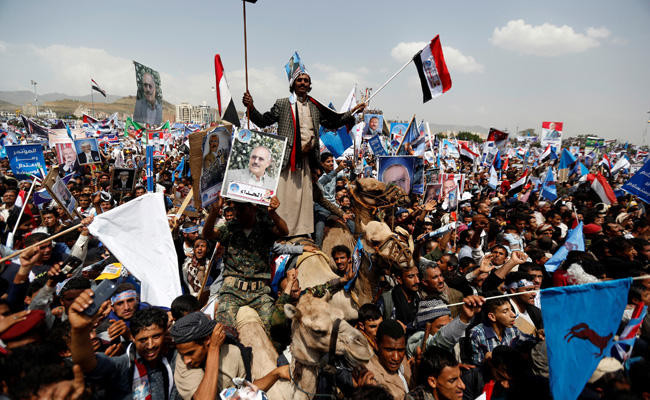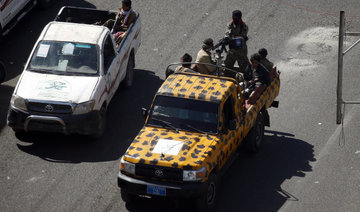JEDDAH: Yemen President Abed Rabbo Mansour Hadi on Monday rallied his countrymen in areas controlled by Houthis to rise up against the Iran-backed militia, who had just murdered their erstwhile ally former president Ali Abdullah Saleh.
In a televised address, Hadi said the Yemeni Army, which has surrounded Sanaa, was ready to support all efforts that aimed to eradicate the Houthis. The legitimate Yemeni government had extended its hand to all sincere Yemeni citizens to start a new page in the country’s future and to establish a new Yemen, based on pluralism, democracy and freedom, he said.
“Yemen is passing through a decisive turning point that needs our unity and steadfastness in the face of these sectarian militias,” Hadi said. “Let’s put our hands together to end this nightmare.”
Saleh was assassinated on Monday by Houthi militias, two days after he broke ranks over disagreements with his allies.
The militias overran Saleh’s home in the capital, Sanaa, and the former leader fled south toward his home village of Sanhan. Houthi gunmen halted his four-vehicle convoy 40 km from the city and opened fire. Saleh, 75, was killed along with Arif Al-Zouka, secretary-general of the former president’s General People’s Congress party, and Al-Zouka’s deputy Yasir Al-Awadi.
Video posted on social media showed Saleh’s motionless body with a gaping head wound, his eyes open but glassy, and blood staining his shirt under a dark suit. The footage showed Houthis carrying the body in a blanket and dumping it in a pickup truck.
Saleh ruled Yemen for more than 30 years, stitching alliances and playing off one tribe against another. He once described governing the country as like dancing on the heads of snakes.
The former president was replaced in 2012 by his deputy, Hadi, against whom he joined forces with the Houthis to stage a coup. Saudi Arabia formed a military coalition in 2015 to restore Hadi’s internationally recognized government. On Saturday, Saleh had turned his back on the Houthis and offered talks with the Saudi-led coalition.
Rajeh Badi, a spokesman for the Hadi government, said it was a sad day in the history of Yemen.

He said the assassination was “yet another crime added to the bloody record of the Iran-backed Houthi militias. The gravity of the inhumane murder of Saleh should move all Yemenis to stand behind the legitimate government against the coup militias who have brought only chaos and destruction to Yemen, to the Yemeni people, and whose aim is to implement a sectarian Iranian agenda in the region.
“The act is further proof that these militias adopt an ideology of exclusion. We call upon the Yemeni people to make the assassination of Ali Abdullah Saleh a turning point in the country’s history and encourage all people to join ranks with the legitimate government and against the evil terrorists.”
Dr. Hamdan Al-Shehri, a Saudi political analyst and international relations scholar in Riyadh, said Saleh’s death was sad news but would unite all Yemenis against the Houthis.
“It is very clear now that this is a fight between Arabs and Persians. All Arabs and Muslims will unite against the machinations of Iran,” he told Arab News. “This will turn out to be the death-knell for Iran.”
Al-Shehri said Saleh had miscalculated when he aligned himself with the Houthis. “He thought he could share power with them. He should have known better. The Iranians never share power. They want everything for themselves or else they kill — which is what happened with Saleh.”
Saleh’s supporters “need a leader tonight to rally them and the Yemeni people against the Houthis,” Al-Shehri said. He suggested Saleh’s son, Ahmed, commander of the elite Republic Guard and former ambassador to the UAE, where he now lives.
“There can be no better leader than Ahmed, who Saleh was grooming as his heir, and who will want to avenge the death of his father and restore stability to Yemen.”
Saudi writer Abdel Aziz Aluwaisheg, writing in Arab News, said: “Saleh paid with his life for defying the Iranian-backed Houthi militias. Many Yemenis have met similar fates when they dared to stand in the way of the Houthi project.”
Aluwaisheg said assassination was a favorite tactic of the Houthi militias and other pro-Iranian groups such as Hezbollah in Lebanon and the Assad regime in Syria.
“Former Prime Minister of Lebanon Rafiq Hariri met a similar fate in 2005, as did many prominent Lebanese political figures, journalists, writers and religious leaders,” he said.
Meanwhile, fighting and air strikes have intensified in Sanaa, where roads were blocked and tanks were deployed on many streets, trapping civilians and halting delivery of vital aid including fuel to supply clean water, the UN said on Monday.
Some of the fiercest clashes were around the diplomatic area near the UN compound, while aid flights in and out of Sanaa airport had been suspended, the UN said after its appeal for a humanitarian pause on Tuesday.
“The escalating situation threatens to push the barely functioning basic services ... to a standstill. These services have already been seriously compromised with the latest shock of the impact of the blockade,” it said, and fighting had also spread to other governorates, such as Hajjah.




























